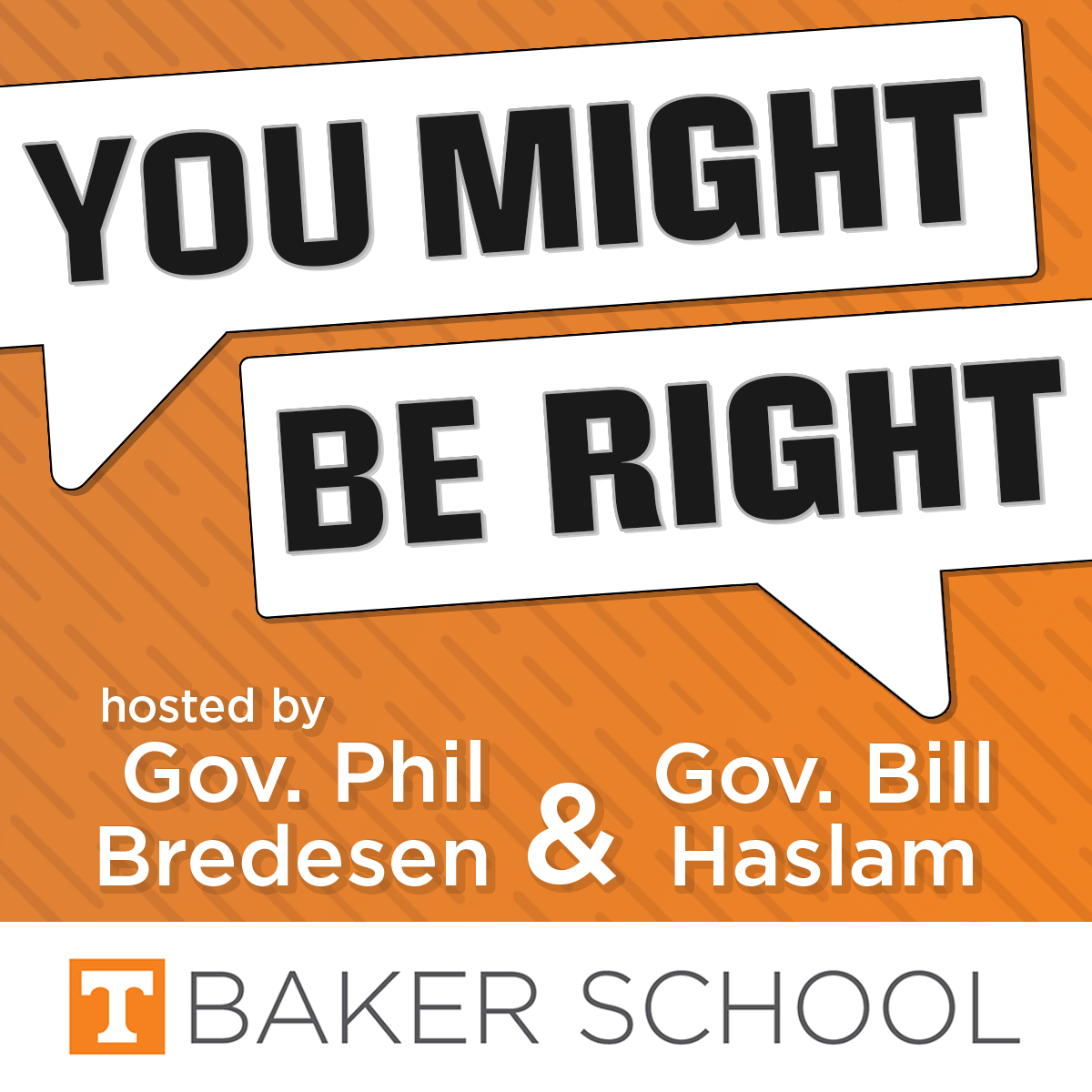Phil and Bill Discuss Their Political Parties
To kick off season four, the governors reflect on our country’s two-party system and their own part affiliations.
Two political parties dominate the American political landscape, but as we approach the 2024 presidential election, a growing number of Americans are dissatisfied with both parties, and the values for which the parties stand seem to be evolving. As a kickoff to Season Four of You Might be Right, which will focus on election-related topics, our hosts, former Tennessee Governors Phil Bredesen and Bill Haslam, reveal why they chose to be part of their respective political parties and how they are squaring their own values with America’s evolving political landscape. Their conversation was moderated by Marianne Wanamaker, Dean of the Baker School.
Subscribe and follow You Might be Right wherever you get your audio content – including Apple Podcasts and Spotify – to never miss an episode, or sign up for our email list to receive new episodes straight to your inbox each week here.
“Parties do change and evolve”
The governors opened the conversation by sharing why they affiliate with their respective parties, the values that originally drew them in, and if they think those values have changed.
Governor Bredesen described growing up in upstate New York, where “everybody’s a Republican, no matter what you do or where you’re from,” before going to college, where “everybody was a Democrat.”
“I guess it really comes back to, I grew up with my grandmother who had a sixth-grade education and was a seamstress, and I just always thought that Democrats had more to say to her and more to offer to her than I thought Republicans did, even though she was a Republican,” he said.
Governor Haslam noted that he got his “intro to politics” growing up through his father’s involvement in Republican politics and campaigns and eventually realized his own views aligned with values that Republicans historically have cared about – balancing the budget, free markets, and the U.S. playing a strong role on the world stage.
Both governors noted their respective parties have evolved over time, but that they had never considered leaving. “Parties do evolve and change, and the makeup of those people change as well,” said Governor Haslam. “When you start drawing really narrow lines and say, ‘Well, you’re in, you’re out,” I think that’s bad for the party.”
“Ultimately, what’s the right answer?”
Both Bredesen and Haslam held nonpartisan elected positions as mayor (of Nashville and Knoxville, respectively) before being elected governor, and discussed the switch from holding a nonpartisan office to a partisan one.
“It took me a while to fully grasp how different it was,” said Governor Haslam. “I strongly believe local elections should be nonpartisan. I’ll argue that one till the day I die, that that’s the right approach. I fully understand and agree with having state and national elections be partisan, but I wasn’t quite prepared that everything was seen through that viewpoint, that everything was through that lens of, ‘Well, the Democrats are for this, so we’ve got to be against that,’ or whatever it is. And it’s an adjustment, and not necessarily a good one, to always see things through that lens instead of, ‘Well, what’s the right answer? As a Republican, here’s going to be my natural approach to it, but ultimately what’s the right answer?’ And that took some adjustment.”
Governor Bredesen described the differences in working with Nashville’s 40-person metropolitan council as mayor, and with the legislature as governor.
“When you are mayor…what I found was you had the freedom to put together a coalition of people for any individual subject that wasn’t always the same,” he said. “The coalition to bring a football team here was totally different from the coalition to build schools, whereas once you get in into a partisan mode like the governor’s office and the legislature is, it’s a very different dynamic. You need to have your party with you and then find a few other kinds of people to get something done, but you lose the ability to put together these very flexible and fluid coalitions.”
“In both parties, there are a lot of different ways that people see the world”
As to what they wish both parties would do differently, the governors came back around to the spirit of the podcast – the willingness to listen and keep an open mind, and not think of the other side as the enemy.
“I think just having some respect for the fact that in both parties, there are a lot of different ways that people see the world,” said Governor Bredesen. “I’m from a small town and I believe probably much more strongly in individual responsibility than my party does. It’s just been important to me. And I don’t know if it’s right or wrong, but it’s a pretty deeply ingrained belief, and I wish the parties could be more understanding of the fact that it’s not that one is right and one is wrong and this one has to win. There is always going to be a wide diversity of experiences and ways of approaching things.”
“What I wish both sides would realize is that…there’s a whole lot of the country that’s voting differently,” added Governor Haslam. “That should help our political decisions, to realize that a good part of the country does not agree with me despite the fact that everybody I live with and work with and worship with does.”
Subscribe and follow You Might be Right wherever you get your audio content – including Apple Podcasts and Spotify – to never miss an episode, or sign up for our email list to receive new episodes straight to your inbox each week here.

Join the conversation on Twitter by following @UTBakerSchool, @PhilBredesen, and @BillHaslam.